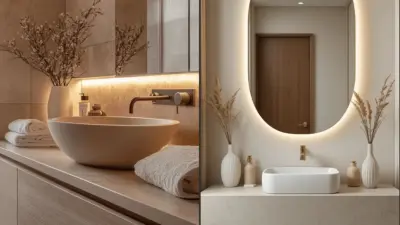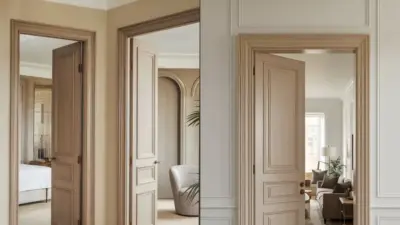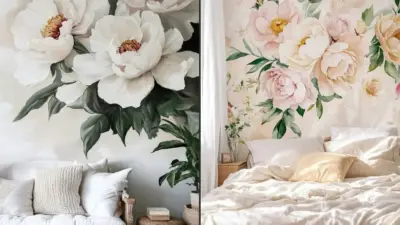
Modern kitchen design blends style and function to create a space that feels both fresh and practical. From clean lines to clever storage, these kitchens focus on simplicity without losing personality. The key to modern kitchen design is balancing minimalism with useful features that fit everyday life.
Light and color play a big role in shaping a modern kitchen. Neutral tones combined with natural materials give the room a calm, inviting vibe. Innovative storage ideas and smart layouts help keep everything organized and easy to find.
Technology and eco-friendly choices are becoming important in today’s kitchens. They add convenience and reduce waste without making the space feel cluttered. Personal touches make each kitchen unique while keeping the modern look intact.
Key Takeaways
- Modern kitchens blend simple design with practical features.
- Light colors and smart storage make kitchens feel open and organized.
- Technology and green options enhance function and style.
Key Elements of Modern Kitchen Design
Modern kitchens focus on clean lines, smart use of space, and technology that blends seamlessly. Key features include a simple look, an open layout, and hidden appliances that improve functionality while keeping the kitchen neat.
Minimalist Aesthetics


Minimalist design uses fewer colors and materials to keep the kitchen calm and uncluttered. Cabinets often have flat fronts with no handles, creating a smooth surface. Neutral colors like white, gray, and black are popular for walls and furnishings.
Storage is built-in to hide clutter, and countertops have little decoration. Lighting is simple and functional, often using recessed lights or under-cabinet strips. The goal is to make the kitchen feel spacious and easy to clean.
Open-Concept Layouts
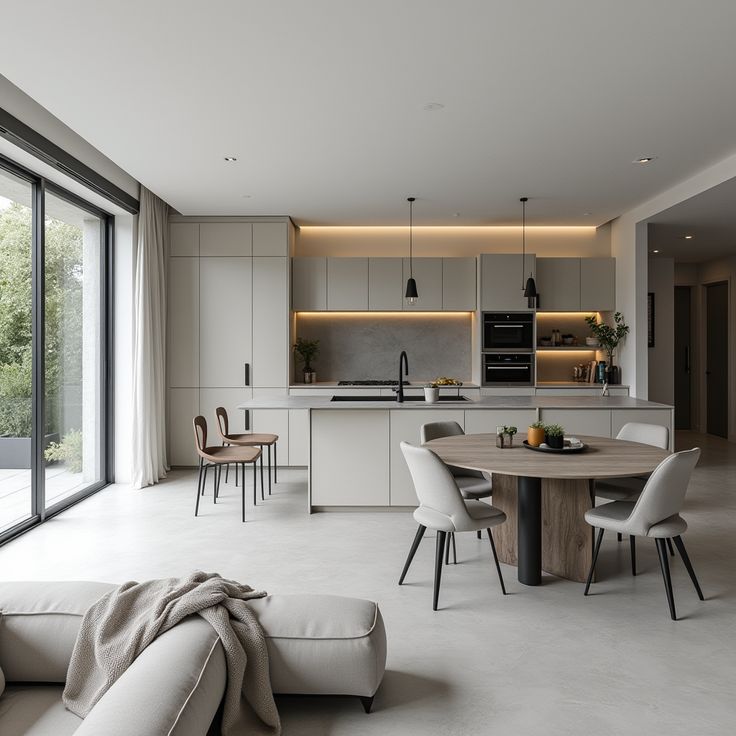
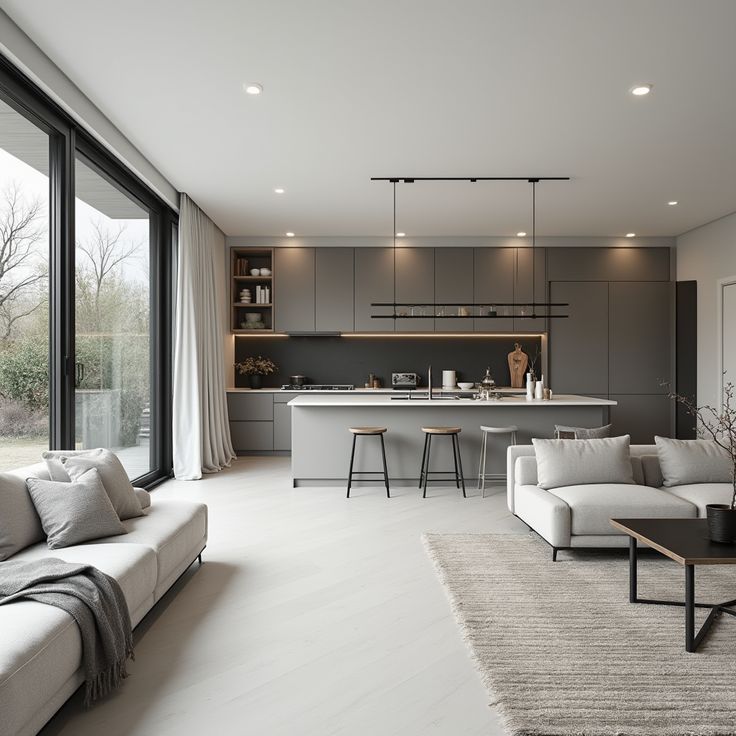
Open-concept kitchens remove walls to connect the kitchen with dining and living areas. This design helps people interact while cooking and makes the space feel bigger.
The key is efficient use of space, often with kitchen islands or peninsulas that serve multiple roles, such as prep, dining, or storage. Clear sightlines and easy movement paths are important for safety and comfort.
Integrated Appliances


Modern kitchens often hide appliances to keep the look seamless. Refrigerators, dishwashers, and ovens match the cabinets with panels covering their fronts.
Built-in microwaves and ovens save counter space. Appliances are smart-powered with energy-saving features, helping reduce utility costs without sacrificing performance. This integration supports a clean, organized kitchen environment.
Modern Kitchen Color Schemes
Color sets the mood and style in modern kitchens. Choosing the right hues can highlight features, add personality, and create a unified look. Popular schemes include calm neutrals, sharp contrasts with bold accents, and clean monochromatic styles.
Neutral Tones
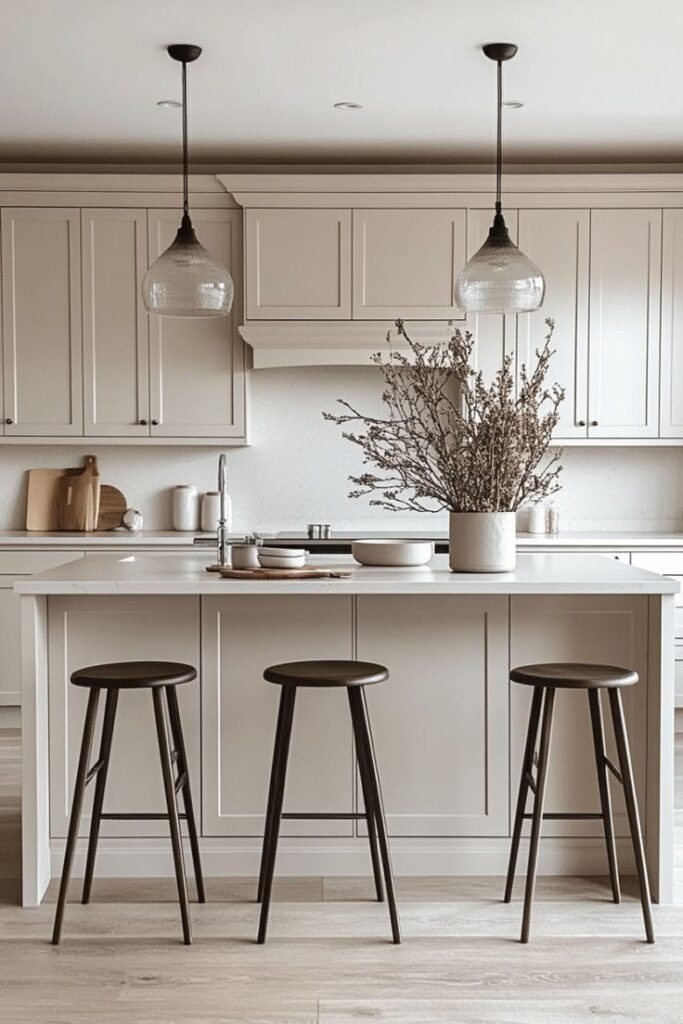
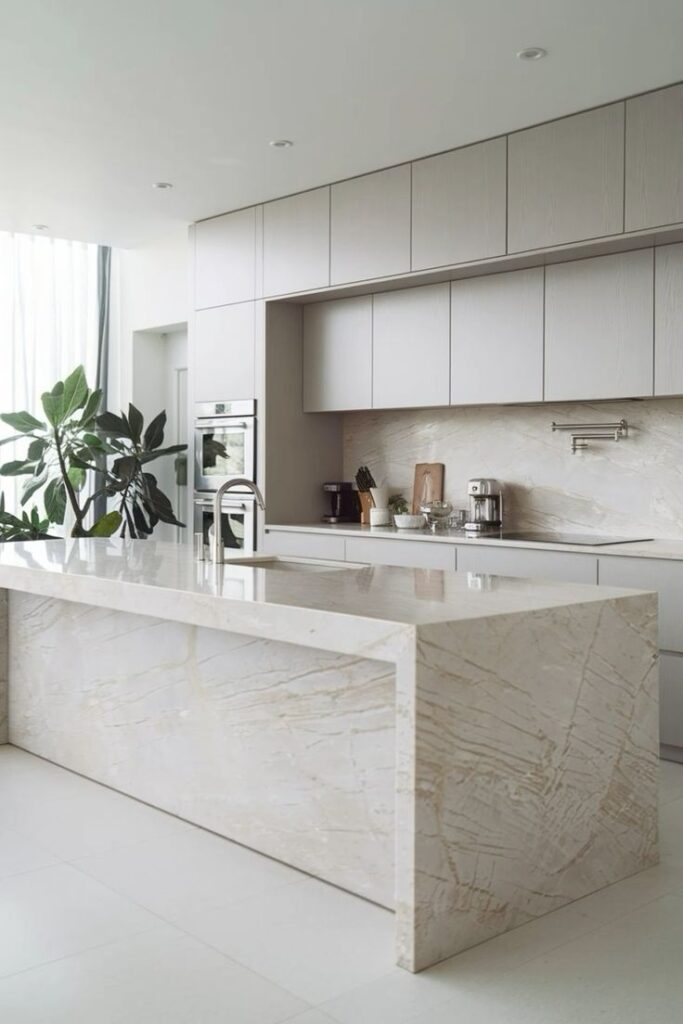
Neutral colors like white, beige, gray, and soft browns dominate modern kitchen designs. These shades make the space feel bright, open, and timeless. They work well with natural materials such as wood and stone, giving the kitchen a warm but simple look.
Using neutrals allows for flexibility with decor and appliances. White cabinets paired with gray countertops or beige walls create a balanced, easy-to-update design. Matte finishes add sophistication without being flashy.
Bold Accent Colors

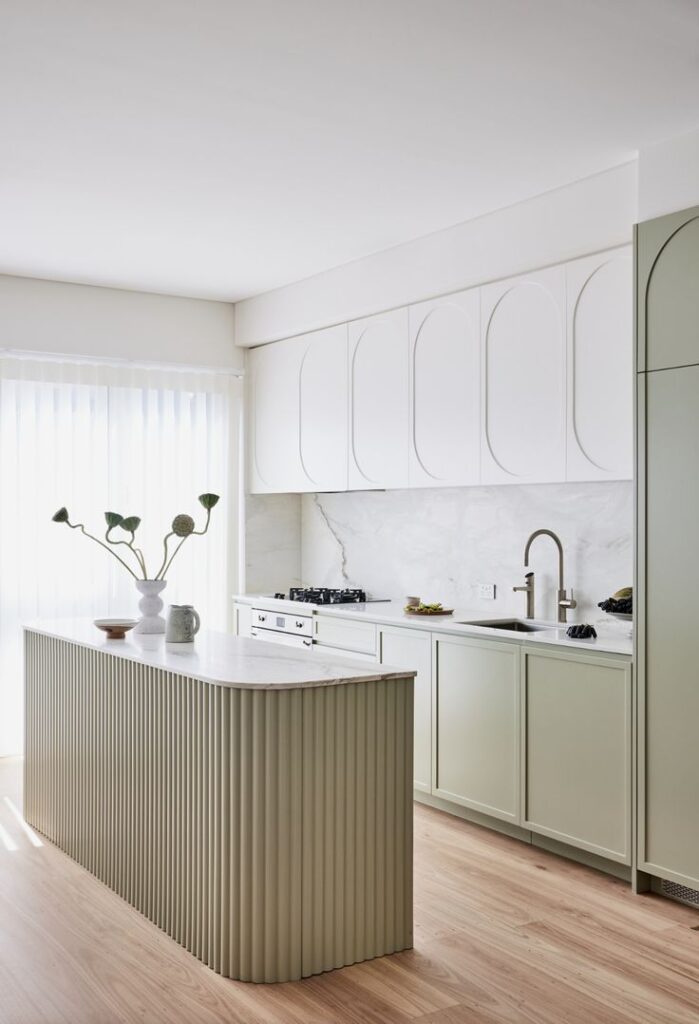
Bold accent colors add energy and focus points in a modern kitchen. Shades like deep navy, emerald green, or vibrant red can make cabinets, islands, or backsplashes stand out.
It’s essential to limit bold colors to small areas. This prevents the space from feeling overwhelming. Pairing bold accents with neutral bases keeps the design balanced.
For example, a charcoal gray kitchen with mustard yellow island cabinets creates a trendy look. Metallic accents, like brass handles, complement bold colors well.
Monochromatic Palettes

Monochromatic palettes use different shades of a single color for a sleek, harmonious look. This approach is common with grays, blues, or greens in modern kitchens.
Layering various tones adds depth and avoids flatness. For instance, light gray walls, medium gray cabinets, and dark gray countertops create a subtle but rich scheme.
Texture also plays a role here. Glossy and matte surfaces in the same color range bring interest while maintaining simplicity. This style suits those who want a clean and unified appearance.
Innovative Storage Solutions
Modern kitchens use smart storage options that save space and keep everything organized. These storage methods help make the kitchen look tidy while making items easy to find and reach.
Concealed Cabinets
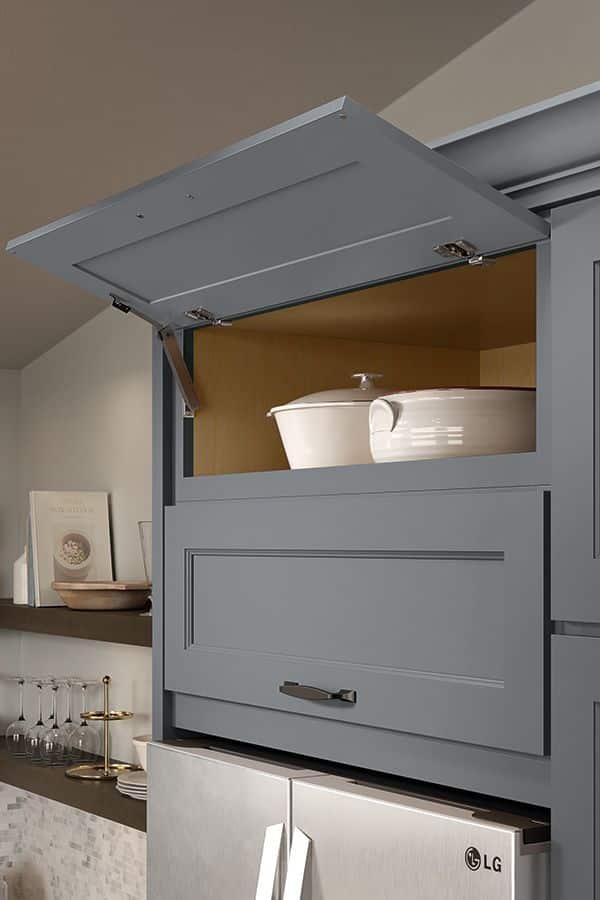

Concealed cabinets hide kitchen tools and appliances behind sleek doors. This gives the kitchen a clean, clutter-free look.
They often use push-to-open or soft-close hinges for smooth access. Some cabinets have built-in lighting that turns on when opened, improving visibility inside.
Concealed cabinets can store anything from small appliances to dishware. This setup helps maintain a minimalist style without sacrificing storage space.
Pull-Out Pantry Systems


Pull-out pantry systems slide out like a drawer, showing multiple shelves full of stored goods. This helps people easily see and reach all pantry items.
They fit in narrow spaces and come with adjustable shelves. These systems maximize vertical space, making them good for small kitchens.
Some models include sections for spices, canned goods, and dry food. Pull-out pantries keep food organized and lower the chance of items getting lost.
Multi-Functional Islands


Kitchen islands with built-in storage add extra space for utensils, pots, and pans. They often include drawers, shelves, and cabinets within the island.
Some islands incorporate seating and workstations, combining storage with function. Others may have hidden compartments or open shelving for quick access.
This type of island helps reduce clutter on counters and improves kitchen workflow. It also serves as a central hub for cooking and socializing.
Cutting-Edge Materials and Finishes
Modern kitchens use materials that balance style, function, and durability. Choices include shiny or soft finishes, eco-friendly options, and unique textures that define the space.
High-Gloss Surfaces
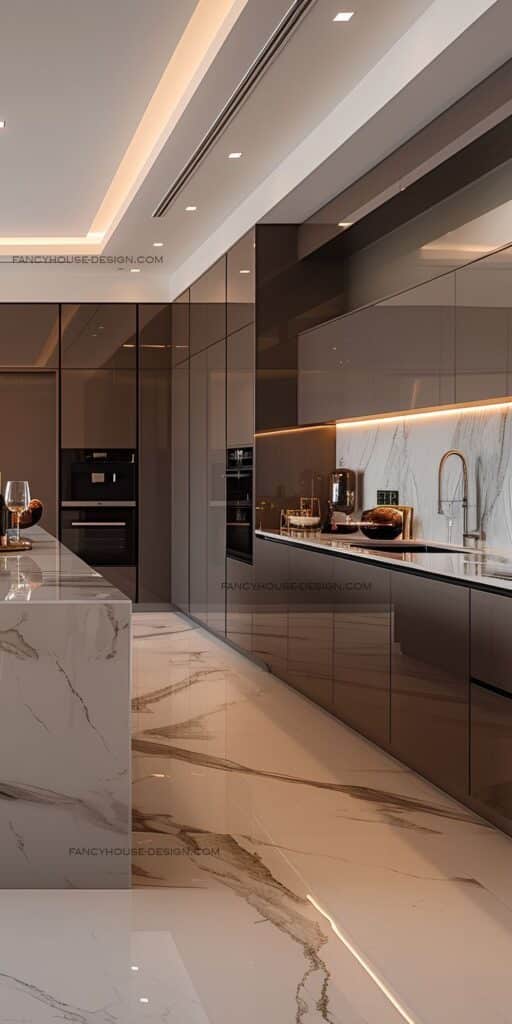
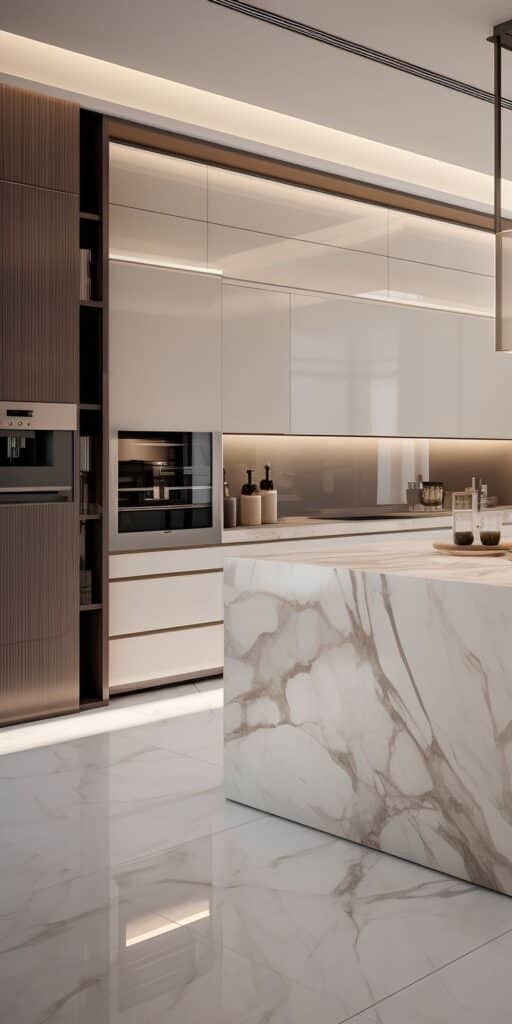
High-gloss surfaces are popular for their sleek, reflective look. They make kitchens feel brighter and larger by bouncing light around the room.
Materials like lacquered MDF, acrylic, and polished lacquer are common in high-gloss finishes. These surfaces are easy to clean but can show fingerprints and scratches easily.
High-gloss cabinets work well in minimalist designs and pair with stainless steel appliances. They require regular maintenance to keep their shine but provide a modern, polished feel.
Sustainable Materials

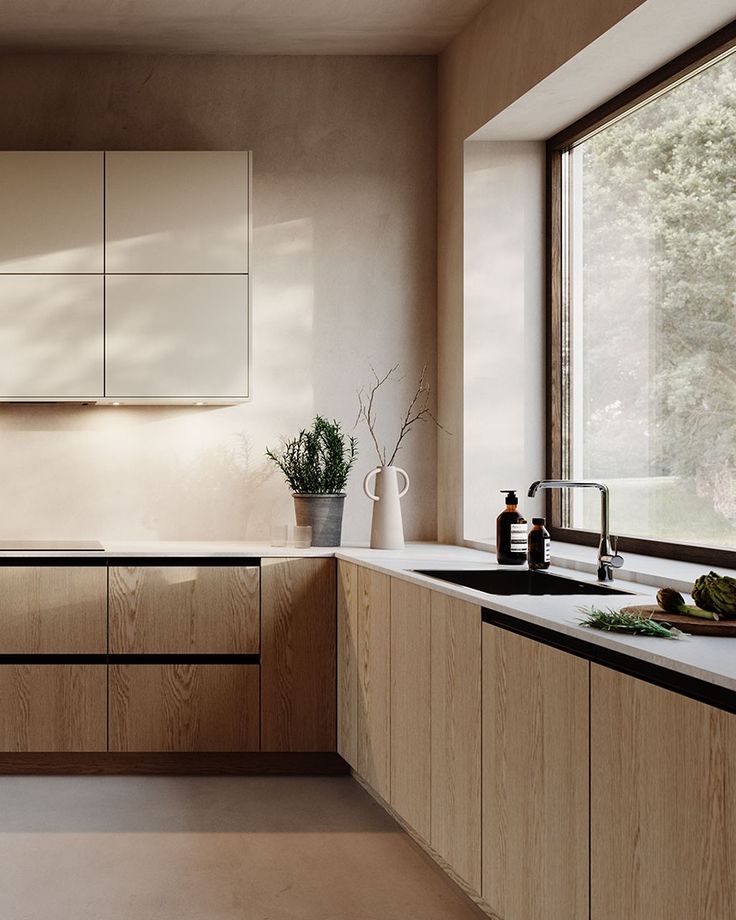
Sustainable materials focus on reducing environmental impact. Bamboo, reclaimed wood, and recycled glass are examples used in kitchen design.
Bamboo grows quickly and is strong, making it a good choice for cabinets and flooring. Reclaimed wood offers a rustic look while saving old materials from waste.
Manufacturers also use eco-friendly paints and finishes with low VOCs (volatile organic compounds). These choices improve indoor air quality and support green building practices.
Matte Finishes
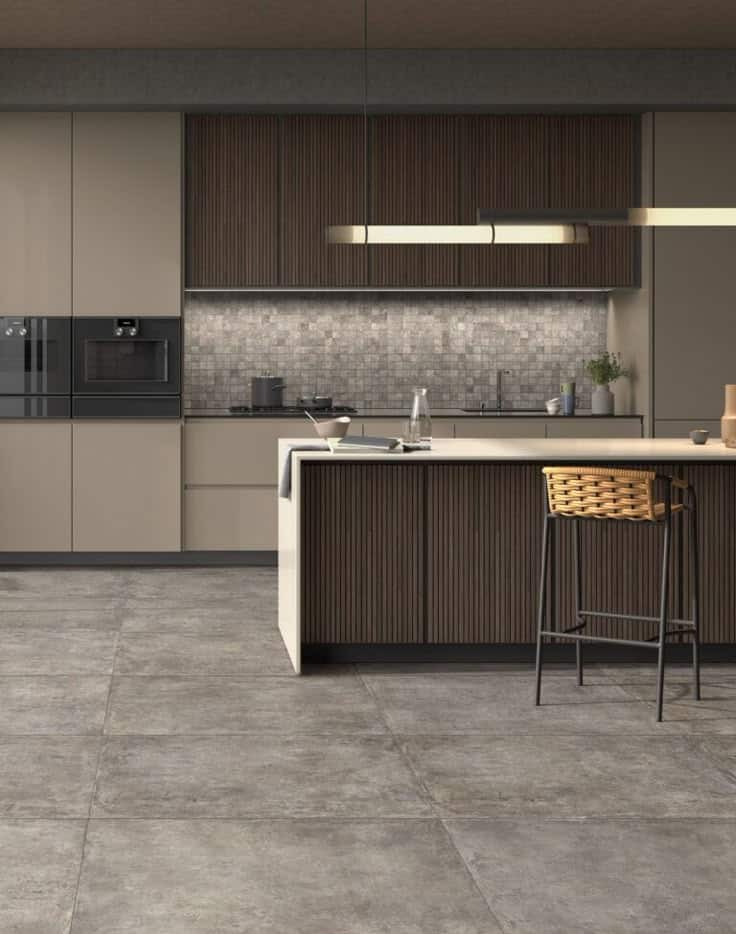

Matte finishes have a flat, non-reflective surface that hides fingerprints and smudges well. This makes them practical for busy kitchens.
Materials include matte lacquer, painted wood, and quartz countertops. Matte finishes provide a soft, understated look that contrasts with shiny appliances and fixtures.
Matte surfaces are durable and less likely to show wear over time. They fit well in both traditional and contemporary kitchen styles, offering a subtle elegance without glare.
Lighting Ideas for Modern Kitchens
Lighting in modern kitchens balances style and function. It highlights workspaces, enhances design elements, and creates a welcoming atmosphere. Different lighting types serve unique roles for practical use and visual appeal.
Under-Cabinet Lighting

Under-cabinet lighting provides direct illumination on countertops. It helps reduce shadows while cooking or prepping food.
LED strips or puck lights are common choices. LED options save energy and last longer. They come in various color temperatures, from warm to cool white, letting users pick what suits their kitchen mood.
Installation is usually hidden beneath cabinets, keeping the look clean and modern. Controls may include dimmers or motion sensors for convenience and energy efficiency.
Pendant Fixtures
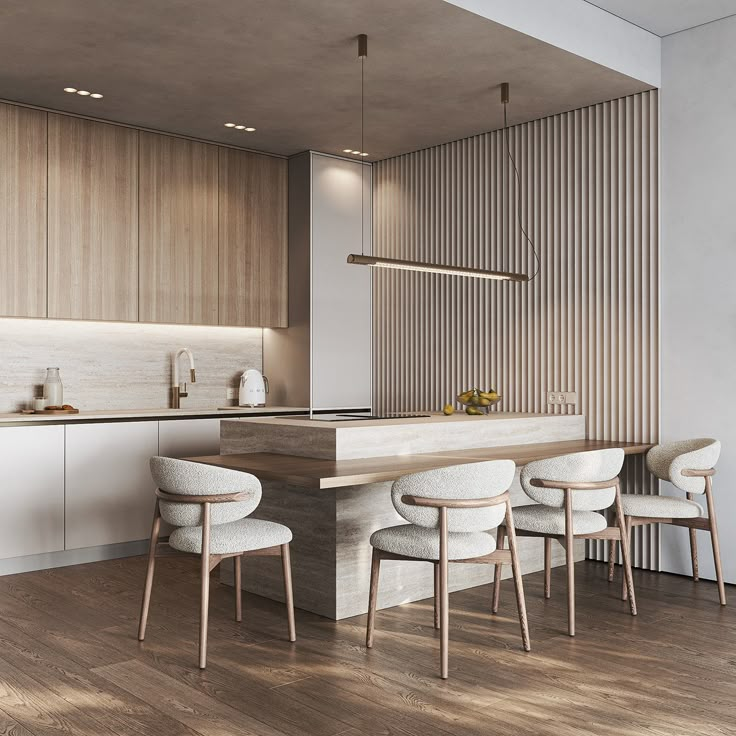
Pendant lights often serve as focal points over kitchen islands or dining areas. They add style and task lighting in one fixture.
Designs range from simple glass shades to geometric metal structures. The size and height of pendants should match the space to avoid crowding or poor light distribution.
Choosing adjustable fixtures helps customize lighting for different activities. Grouping multiple pendants together can increase brightness and add a balanced look.
LED Task Lighting
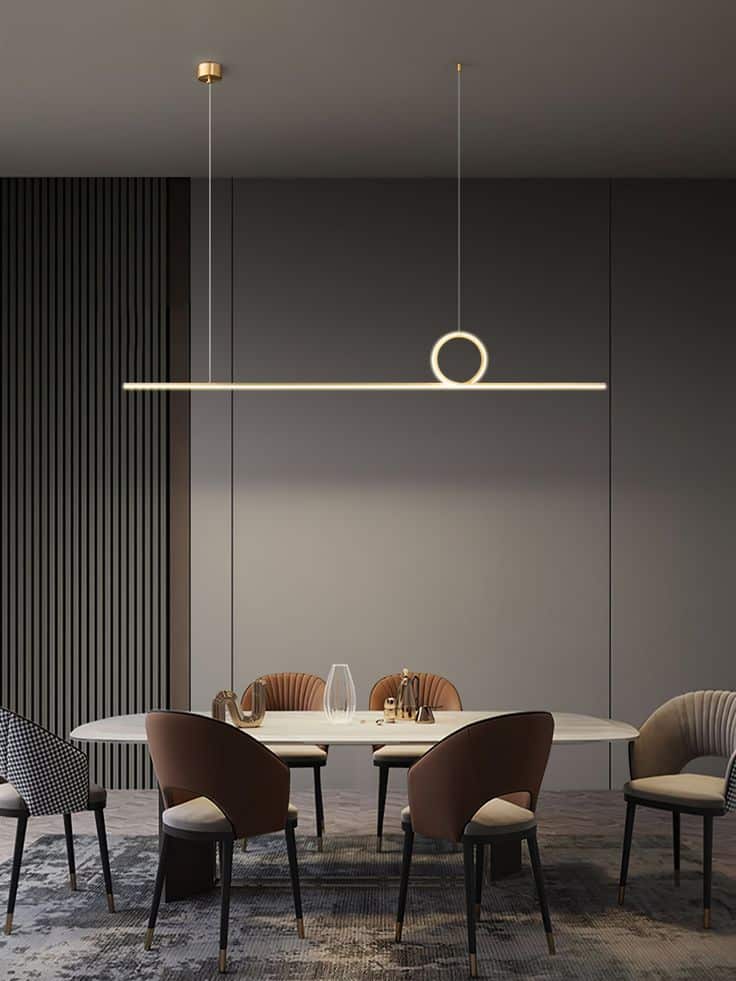
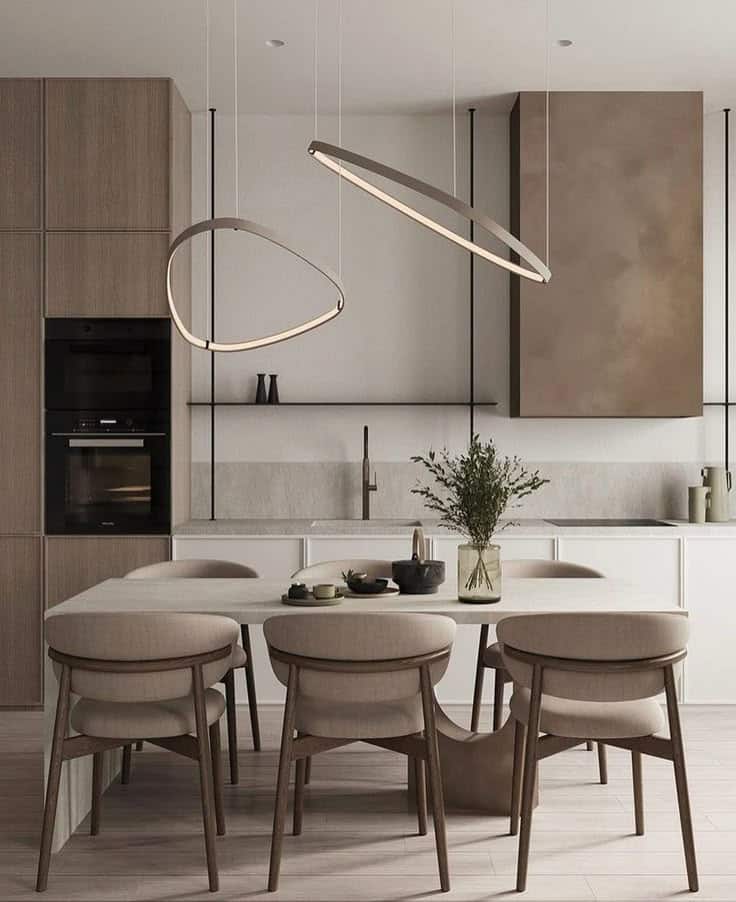
Task lighting targets areas where detail work happens, like stove tops and sinks. LED options offer bright, focused light and are energy efficient.
They can be recessed into ceilings or installed as track lighting. Adjustable heads let users direct light exactly where needed.
LED task lighting is flexible for different kitchen layouts and works well with ambient or accent lights. It supports safety and precision during cooking and cleaning.
Modern Kitchen Layout Inspiration
Modern kitchen layouts focus on efficiency and space use while keeping a clean look. Each layout offers unique benefits depending on kitchen size, workflow, and personal needs.
Galley Kitchens
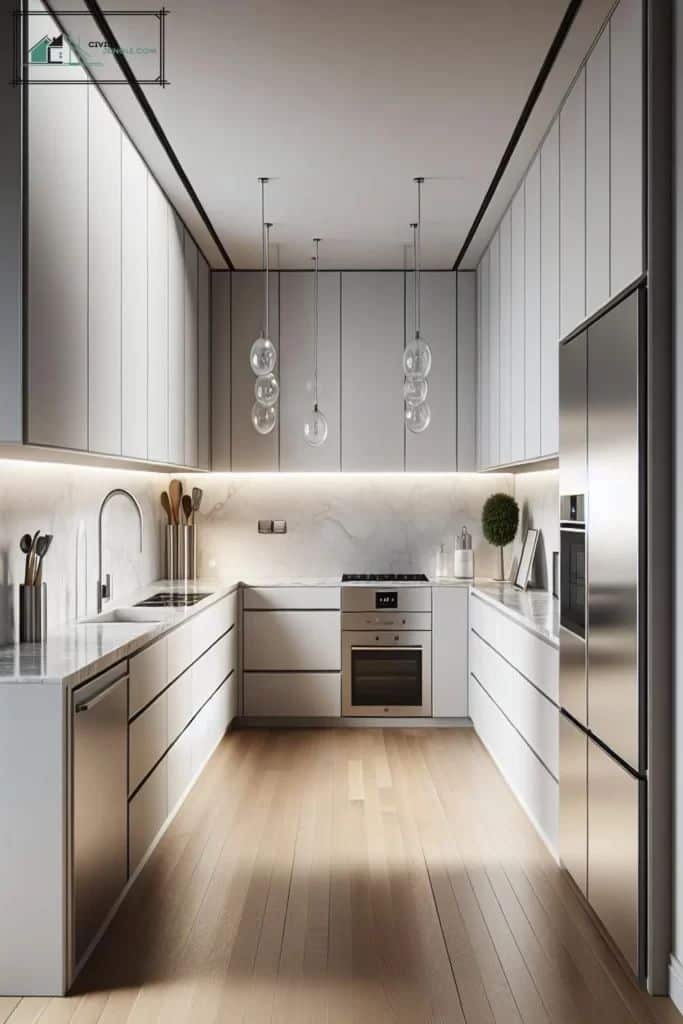
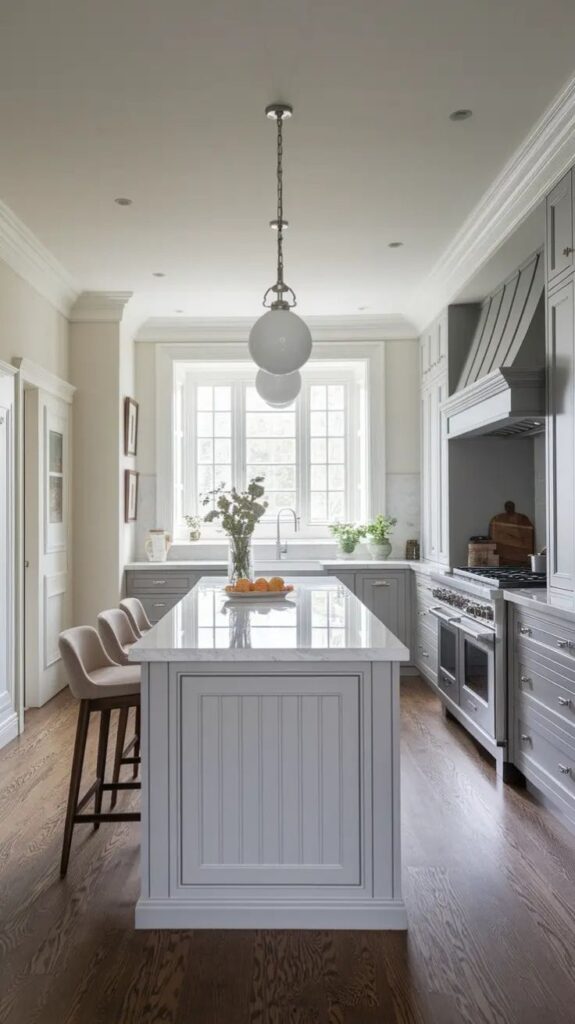
Galley kitchens feature two parallel counters with a walkway between them. This layout is ideal for small to medium spaces, maximizing work areas on both sides. It allows for easy access to appliances and storage without needing much floor space.
Efficiency is key in galley kitchens. The compact design supports a smooth cooking process with everything within arm’s reach. Adding pull-out drawers and vertical storage can increase usability. Proper lighting is important to brighten the narrow space and avoid a cramped feel.
L-Shaped Designs

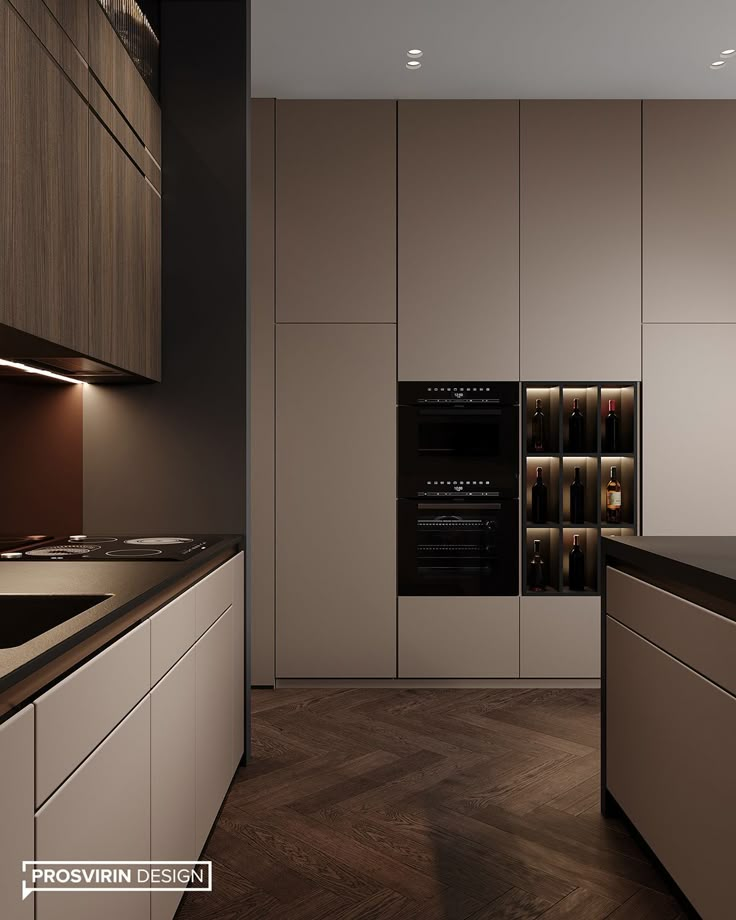
L-shaped kitchens use two adjoining walls to form a right angle. This layout offers an open, flexible workspace. It works well in both small and large rooms and often connects to dining or living areas.
This design allows multiple people to cook and move freely without getting in each other’s way. It also creates natural zones for cooking, prep, and cleaning. An island can be added for extra counter space or dining. Corner cabinets with lazy Susans improve storage in hard-to-reach areas.
U-Shaped Spaces

U-shaped kitchens wrap around three walls, providing ample storage and surface area. This layout suits larger kitchens and promotes an efficient work triangle by placing the sink, stove, and fridge close together.
A U-shaped design offers clear separation of different kitchen tasks. It allows room for multiple cooks and plenty of counter space for meal prep. The addition of a breakfast bar or small island can make the area more social. It’s best used where traffic flow won’t block the work zones.
Smart Technology in Modern Kitchens
Smart technology makes kitchens more efficient and user-friendly. It helps with everyday tasks and improves how appliances work together. This technology saves time and adds convenience.
Voice-Activated Devices
Voice-activated devices allow hands-free control of kitchen functions. Users can set timers, play music, or control smart lights by speaking commands. This reduces the need to touch screens or buttons with messy hands.
Popular devices include Amazon Alexa and Google Assistant. They connect with other smart gadgets like fridges and ovens. This lets people ask for recipes or adjust temperatures without stopping what they are doing.
Voice commands can also control smart plugs and coffee makers. This makes it easier to manage multiple appliances quickly and safely.

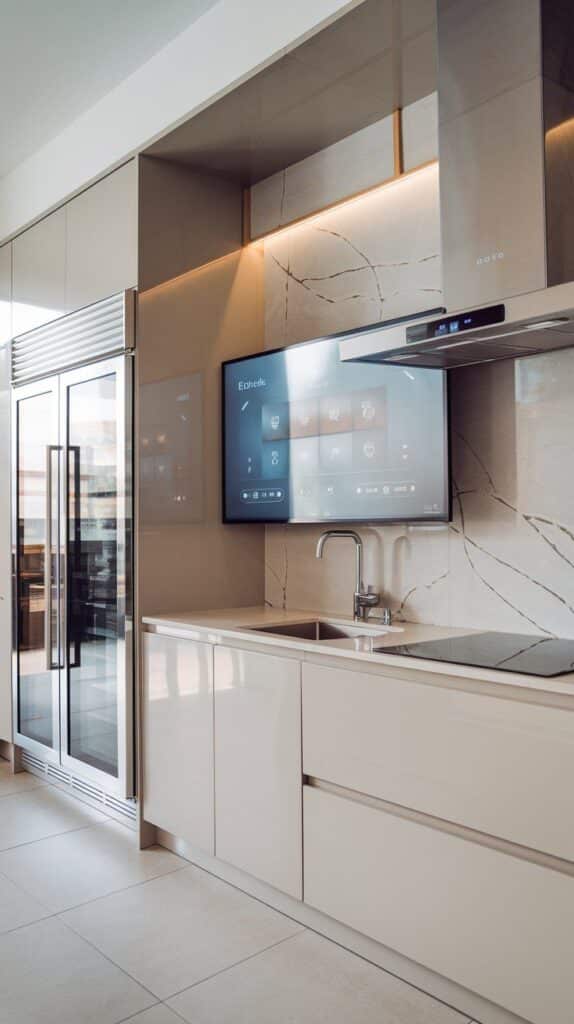
Smart Appliances
Smart appliances connect to Wi-Fi and often have apps for remote control. Smart refrigerators can track food inventory and send alerts when items run low or expire. They may also have touchscreens for notes or recipes.
Smart ovens and cooktops offer precise temperature control and can be preheated remotely. Some models include cameras inside to monitor cooking progress from a smartphone.
Dishwashers with smart features track usage and notify users when cycles finish. These appliances save energy by optimizing their operation based on usage patterns.
| Appliance | Key Feature | Benefit |
|---|---|---|
| Smart Refrigerator | Inventory tracking, touchscreens | Reduces food waste |
| Smart Oven | Remote control, internal cameras | Improves cooking accuracy |
| Smart Dishwasher | Usage alerts, energy-saving modes | Saves energy, convenience |
Personalizing Your Modern Kitchen
A modern kitchen can be made unique by adding special details that reflect personal style. Choosing distinct materials and finishes can elevate both the look and feel of the space.
Custom Backsplashes
Custom backsplashes let homeowners add character behind sinks or stoves. They can choose from materials like glass, ceramic, or metal tiles to create patterns or colors that match or contrast with counters and cabinets.
For example, a geometric tile design in shades of gray and white adds modern flair without overwhelming the space. Glass backsplashes reflect light and make the kitchen look bigger.
Some use peel-and-stick vinyl backsplashes for an easy, changeable option. The key is picking a design that stands out but stays practical to clean.
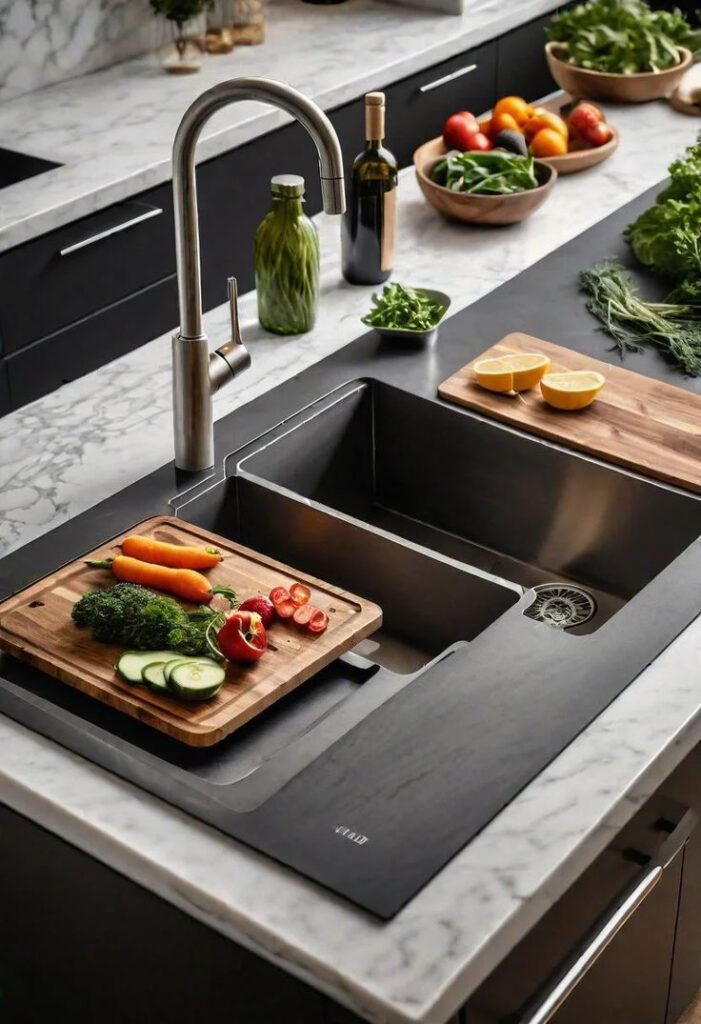
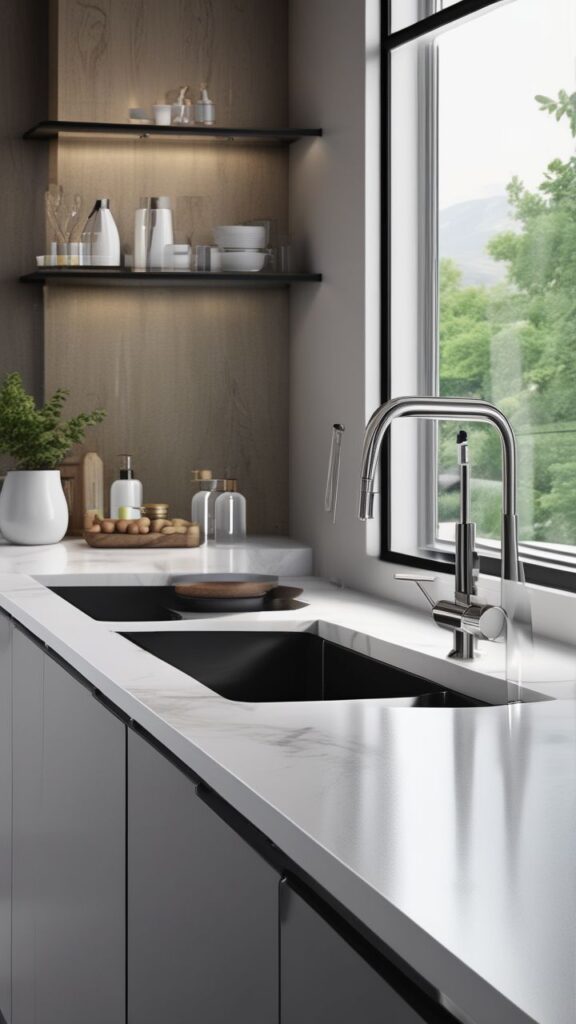
Unique Hardware Choices
Hardware like cabinet handles and drawer pulls provides a subtle way to personalize a kitchen. Using matte black, brushed brass, or copper finishes lifts simple cabinetry with modern appeal.
Shapes matter. Sleek, linear pulls give a streamlined look, while round knobs or unique shapes add personality. Mixing different hardware finishes can create layers of interest but should be balanced to avoid clutter.
Quality hardware improves function and touch experience. Soft-close hinges and smooth glides combined with stylish pulls make everyday use more enjoyable.
Eco-Friendly Modern Kitchen Ideas
A modern kitchen can be eco-friendly by using smart lighting and sustainable materials. Choosing the right fixtures and surfaces lowers energy use and reduces waste.
Energy-Efficient Lighting
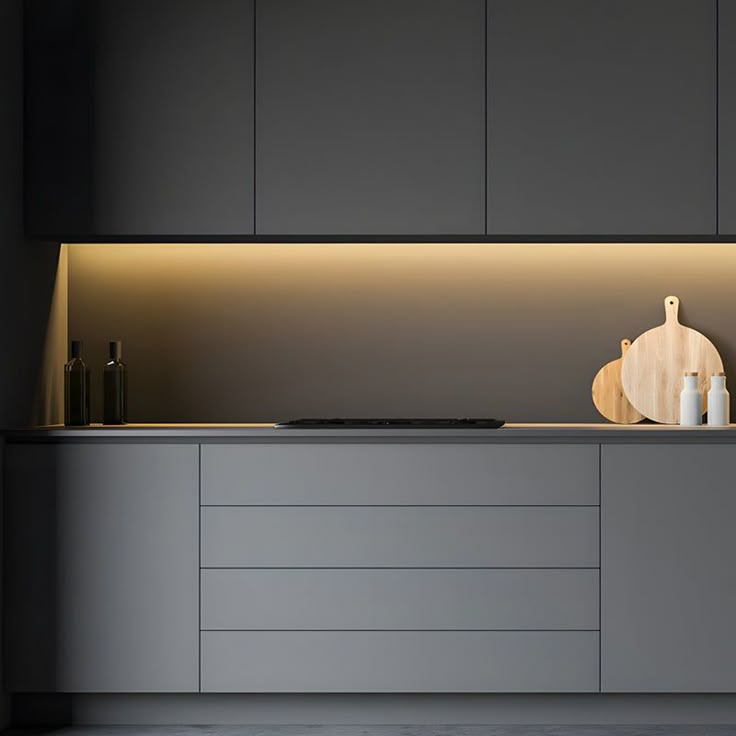
Energy-saving light bulbs like LEDs use up to 75% less electricity than traditional bulbs. They also last longer, which means less frequent replacements and less waste. Installing dimmer switches allows users to adjust brightness, saving energy when full light is not needed.
Natural light can also reduce the need for electric lighting during the day. Large windows or skylights are common features in eco-friendly kitchens. Using motion sensors in less-used areas helps avoid lights staying on unintentionally.
Energy-efficient lighting upgrades can lower electric bills and decrease environmental impact without changing the kitchen’s style.
Recycled Materials


Using recycled materials in kitchen design helps reduce waste and lowers demand for new resources. Cabinets and countertops made from reclaimed wood or recycled glass are popular choices. These materials often have unique textures and colors that add character.
Recycled metal fixtures like sinks and faucets also support eco-friendly design. Flooring made from recycled tiles or bamboo offers durable and sustainable alternatives.
When selecting materials, it’s important to verify certifications or source transparency. This ensures the products genuinely contribute to environmental goals. Incorporating recycled materials combines style with responsibility in a modern kitchen.
Trending Modern Kitchen Designs
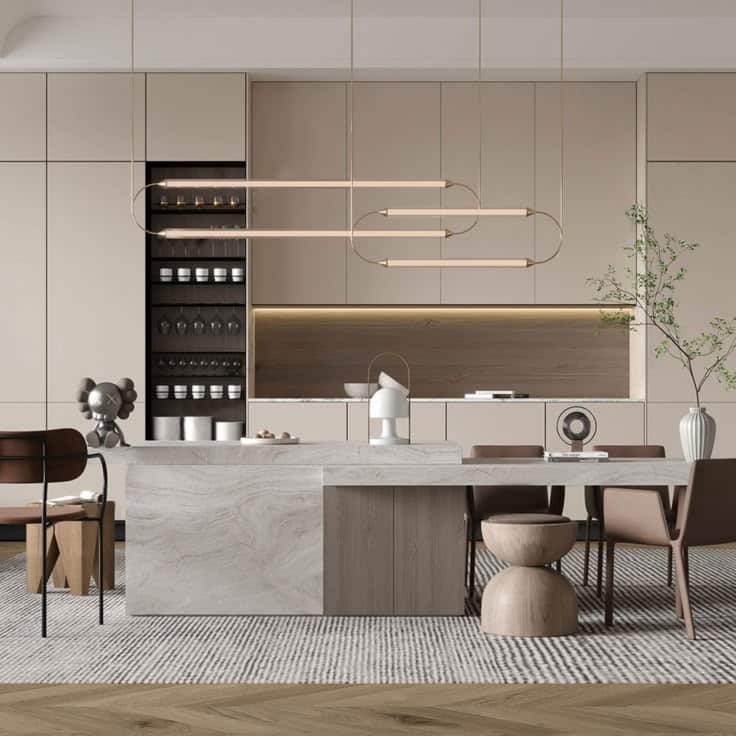
Modern kitchens often focus on clean lines and simplicity. Minimalist styles with hidden storage make the space look neat and organized.
Neutral colors like white, gray, and beige dominate the palette. They create a calm and timeless feel. Some designs add contrast with bold backsplash tiles or dark countertops.
Mixed materials are popular. For example, wood cabinets paired with metal handles or stone counters add texture and interest. Open shelving is also used to display dishes or plants.
Technology plays a key role. Smart appliances like touch-controlled ovens or fridges with screens help improve convenience. Lighting is often layered with recessed lights, pendant lamps, and under-cabinet LEDs.
Here is a quick list of popular features:
- Matte finish cabinets
- Large kitchen islands with seating
- Integrated appliances
- Bold or patterned backsplashes
- Eco-friendly materials and energy-efficient devices
This mix of style and function shows the core of modern kitchen design. It balances clean looks with useful elements.
Conclusion
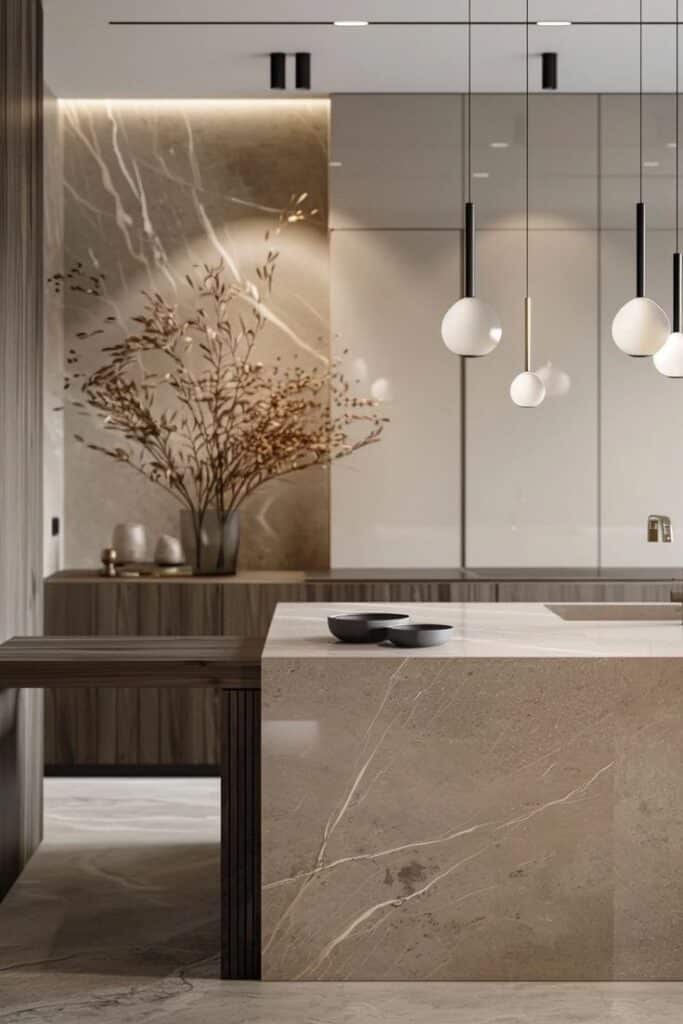

Modern kitchen design focuses on simplicity and function. Clean lines, neutral colors, and smart storage help create spaces that are easy to use and maintain.
Technology plays a key role. Features like smart appliances and energy-efficient lighting improve convenience and reduce waste.
Materials matter. Durable surfaces such as quartz, stainless steel, and hardwood are popular for their look and long-lasting quality.
Balance is important. A successful kitchen blends style with practicality, making cooking and socializing more enjoyable.
Key elements to consider:
- Efficient layout
- Quality materials
- Modern appliances
- Personalized details
These elements together create kitchens that meet the needs of daily life while reflecting personal taste.
It is clear that modern kitchens are designed to be both beautiful and useful. This approach suits a wide range of lifestyles and homes.
- 6.9Kshares
- Facebook0
- Pinterest6.9K
- Twitter0
- Reddit0

